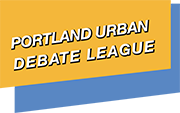Why Debate Matters
Common Core
Debate teaches and reinforces several standards in the Common Core curriculum: speaking, listening, and literacy in social studies. We refer to these skills that debate teaches as the “PEAR” skills, each of which is a Common Core standard or a group of standards:
Presentation – Debaters learn how to organize their ideas logically and speak effectively (CCSS.ELA-LITERACY.SL.6-12.4).
Evidence – Debaters must evaluate the evidence offered to support claims. “Evidence” appears in at least six different, fundamental Common Core standards.
Arguing – Debaters learn the fundamental norms of civil discourse: how to ask questions, how to disagree politely but firmly, and how to find common ground. These arguing/discussion skills appear in several Common Core standards.
Reading – Last but most important, debaters read extensively about their topics to prepare for debates. Literacy is the key focus area of the Common Core standards, with literacy in social studies targeted as especially important. No other educational activity obliges students to read such high-level non-fiction texts, and yet debaters devour every news article, opinion-editorial essay, and social science paper they find, hoping for a competitive edge.
Extensive empirical research has concluded that debate uniquely teaches these critical thinking, civil discourse, and oral communication skills, as well as organization, dedication, and focus. Dr. Parcher provides a clear summary of decades worth of research in “The Value of Debate” (1998). Compared to other academic activities of similar time commitment, debate delivers these benefits at higher levels.
“Debate teaches students a great deal more about organization and arrangement than merely to have an introduction, body and conclusion. Debate teaches them how to construct arguments in a sophisticated manner, examining both the micro and macro perspective of argumentation theory” [emphasis added] (Parcher, 1998).
One meta-analysis, compiling the data of more than 2,000 student-subjects, found that competitive forensics leads to more critical thinking gains than either argumentation classes or public speaking classes. However, all three speech and debate groups had larger gains than the control subjects, with 59% of forensics students compared to 41% of matched control students passing a critical thinking benchmark score, a 44% higher rate (Allen et al., “A Meta-Analysis of the Impact of Forensics”, Communication Education, January 1999).
A large part of debate’s benefit derives from its requirement for active learning and its interactive format. Creating an argument is cognitively demanding and can require debaters to study their topic from nearly every disciplinary angle, from political science, ethics, law, to natural science. It also requires close collaboration between debater, partner, and coach. Likewise, understanding an opponent’s point of view or idea requires active listening. The intensity of the activity and the compulsion to work hard in order to stay competitive is why debater after debater state in interviews that competing in debate was the single most important part of their education (Parcher, 1998).
